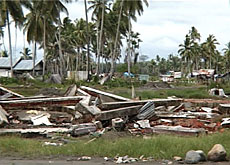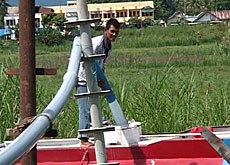Rebuilding tsunami-shattered Sumatra

When it comes to reconstructing tsunami-hit coastal areas of northern Sumatra in Indonesia, the Swiss continue to come up against brick walls.
In the northern city of Banda Aceh, the provincial capital of Aceh, more than 200,000 people are still living in tents and barracks, a year after the seaquake.
Around 170 non-governmental organisations (NGOs), including the Swiss Red Cross, are working in the disaster zone, but for complex reasons, house- and school- building programmes are only just beginning.
In the west coast town of Meulaboh, where half the population was wiped out, the 200 metres of land closest to the sea have been declared unsuitable for reconstruction.
Swiss Catholic charity Caritas has the job of relocating eight villages in Meulaboh town and Aceh Singkil and building a total of 2,550 new houses.
The communities have a say when it comes to accepting the land proposed by the local government. So far, no suitable alternative land has been found.
Ravaged villages
The giant waves that struck the shores of Aceh pulled entire villages into the sea. For several kilometres inland, all that is left is foundations of houses, jagged pillars and piles of rubble.
Zulfikar has pitched his tent a few hundred metres from the ruins of his old house in Banda Aceh. He trawls through the deep puddles between the wrecked buildings, looking for small fish to sell in the market.
The former builder lost his wife and five of his eight children in the tsunami. He has since remarried and his new wife is pregnant. But their battered tent, meant to last only six months, is hardly a home fit for a newborn baby.
“I’m still waiting to find out when the agencies will give us a new home,” he tells swissinfo.
Delays
The obstacles in the way of housing people like Zulfikar are considerable.
Around 130,000 people died in Banda Aceh. Around 400 of those were civil servants. The land registry and all property deeds were destroyed, and there are very few people left with any experience of land issues.
Proving land ownership requires corroboration from former neighbours, a time-consuming process.
Those who lived in areas that have disappeared into the sea – many of them fishermen – need to be relocated into coastal regions, but good land is expensive and hard to come by.
Some NGOs can get hold of funding for building fairly easily. Swiss charities, however, have to submit detailed proposals for approval by Swiss Solidarity, the fundraising arm of the Swiss Broadcasting Corporation, swissinfo’s parent company. The whole process can take months.
Another problem is the scarcity of building materials. There is a huge demand for wood, cement and bricks, most of which need to be transported along a bumpy road from Medan, 700km away.
Red Cross projects
In January 2005, the Swiss Red Cross was asked by the local education authority to build three schools, an area in which the organisation has some expertise.
One of the projects is in Eumpe Awee, 45 minutes by car from Banda Aceh.
The charity plans to renovate earthquake-damaged school dormitories and build a new school for 400-500 pupils. Fifty houses will also be constructed, to attract people living in tents or barracks in Banda Aceh.
Swiss Solidarity will provide 80 per cent of the funding. The rest is from the Swiss, German and Slovak Red Cross organisations. Construction is expected to take up to two years.
Swiss Red Cross Reconstruction Coordinator Roland Wanner drives over to Eumpe Awee to meet the local architect who will oversee the work. An hour after the appointed meeting time, there is still no sign of him.
Wanner shrugs as he tells swissinfo: “We lose a lot of time with this unpunctual system.”
The three Red Cross organisations have signed a memorandum of understanding with the local government for the building work to be carried out here.
This did not stop the government from signing a new contract with a British Muslim charity to erect a temporary mosque in the place where the Red Cross intended to rehabilitate dormitories.
The NGOs are puzzled by the about-turn, but seem to take it in their stride.
Sigli school
The next day, we drive to the site in the town of Sigli, where the Swiss Red Cross plans to build junior and senior high schools for 1,350 pupils, most of them boarders.
The 40,000 square metres of land designated for the building is now completely flooded by monsoon rains.
As we pull up at the site, a man is wading through waist high water, checking his fishing nets, and this is only the beginning of the rainy season. The water can be expected to rise another 80cm.
“We are afraid to turn down this land as it would set us back months,” Wanner explains. “We will just have to find a way of pumping the water away.”
After that, the whole site will have to be filled with compacted earth, to create a stable base for the foundations and make the building level with the road. It is expected to take three to four years to complete the building.
After a week of studying projects such as this, one begins to understand the enormity of the challenges faced by aid organisations involved in reconstruction.
“Everything goes slowly here,” Wanner says. “It’s just the way people work.”
swissinfo, Julie Hunt in Banda Aceh, Indonesia
After the tsunami on December 26, 2004, the Swiss donated SFr225 million ($175 million) for emergency relief and redevelopment projects.
1000km of Aceh’s coastline were hit by waves rising to 30m.
In Banda Aceh, 60,000 people are still living in tents and 160,000 in barracks.
swissinfo visited coastal regions in the northern Sumatran province of Aceh, to try to find out why it has taken so long for reconstruction projects to get underway.
Reasons for the slow progress include lack of good land, as well land allocation and ownership issues.

In compliance with the JTI standards
More: SWI swissinfo.ch certified by the Journalism Trust Initiative



You can find an overview of ongoing debates with our journalists here . Please join us!
If you want to start a conversation about a topic raised in this article or want to report factual errors, email us at english@swissinfo.ch.